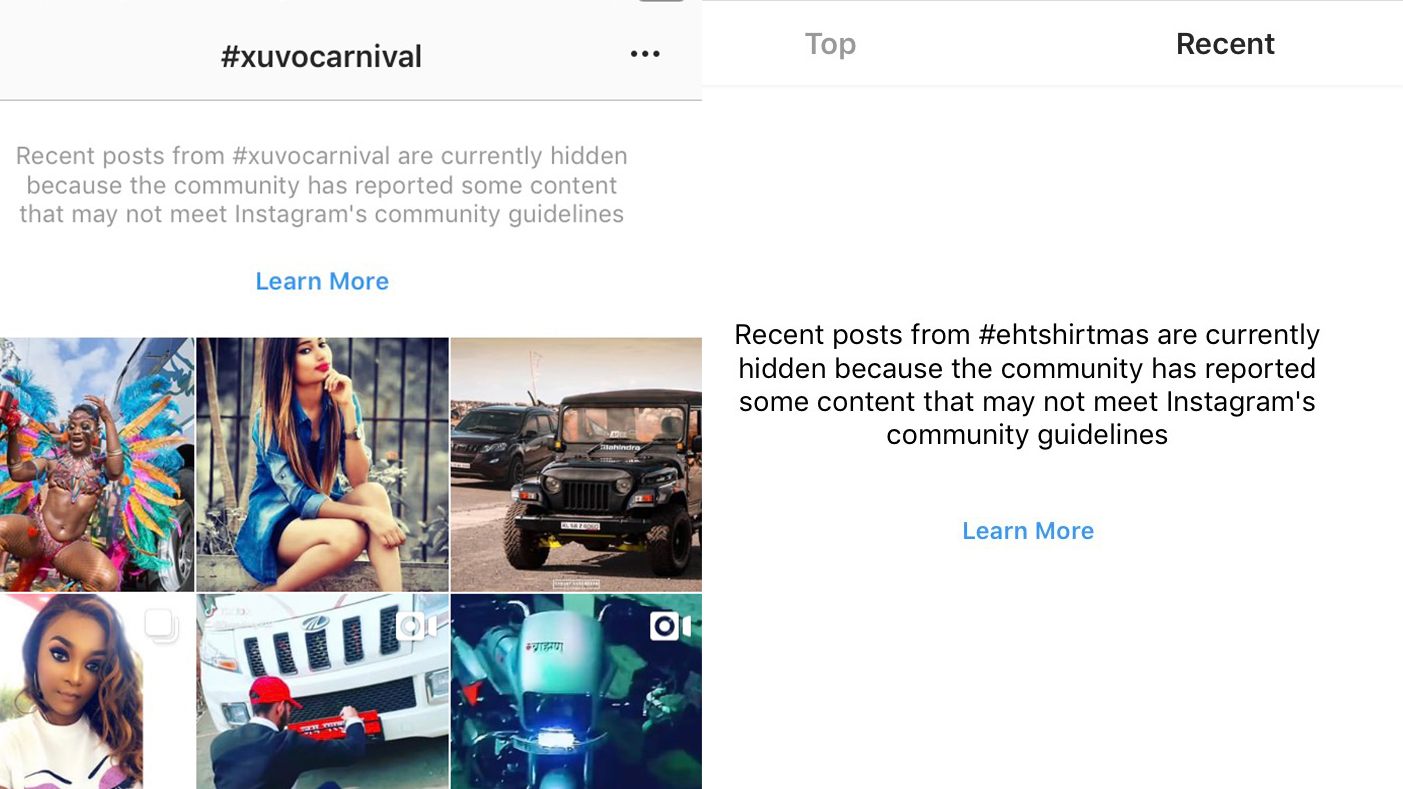This article originally appeared on VICE Canada.
Instagram is apologizing after it made a “mistake” by hiding posts under hashtags related to carnivals in the Caribbean for allegedly falling afoul of the platform's community guidelines.
Shortly after St. Lucia wrapped up its carnival—an annual Caribbean tradition where revellers from around the world parade and dance through the streets in their costumes—on July 16, multiple users noticed that Instagram prompted a community guidelines violation notice when users viewed hashtags #fuzionmas, #stluciacarnival, #trinidadcarnival2020, #xuvocarnival, and #ehtshirtmas, representing carnival events in St. Lucia, Trinidad, and Antigua. “Recent posts from [hashtag] are currently hidden because the community has reported some content may not meet Instagram’s community guidelines,” the message said.
The result was confusion and anger, on the part of carnival goers.
"I find it very offensive that Instagram is deeming carnival culture inappropriate," Frequent carnival-goer Cinelli Mangal said. "Instagram has not indicated which community guideline(s) carnival posts are violating, as they've only linked us to their general policy."

As of Friday, July 19, the prompt did not appear when viewing carnival-related hashtags on Instagram. According to the company, the hashtags were restricted by mistake.
“The hashtags #xuvocarnival and #trinidadcarnival2020, among others, were restricted in error and we are restoring them to full visibility. We apologize for the mistake. Over a billion people use Instagram every month, and operating at that size means mistakes are made—it is never our intention to silence members of our community,” said Alex Kucharski, an Instagram spokesperson.
To manage the vast amount of content uploaded to the platform every day, Instagram—like many social media sites—uses a combination of machine learning and automated filters, as well as user reports, to accomplish moderation tasks such as demoting content and flagging comments.
For some, Instagram restricting carnival-related hashtags for allegedly violating the site's community standards echoed how the celebration is often misunderstood and deemed "inappropriate" by people unaware of the ancestral practice's history.
“It’s hard for me, an avid carnival goer, to imagine how carnival photos could violate Instagram’s ‘community guidelines,'" said Jade Nixon, a PhD student at the University of Toronto studying carnival. Often, she said, ignorant critics of carnival celebrations paint it as overly sexual.
"For those that attend carnival, we know that carnival is an expression of freedom, of personhood, of movement, of moving Blackly that exceeds solely sexual understandings of it. These static, narrow readings of carnival, in my opinion, understand this practice to be a breach."
Conversations around Caribbean carnivals and their diasporic iterations abroad are brimmed with commentary steeped in xenophobia and respectability politics, painting women as devoid of agency or hyper sexualizing them for their participation. In 2016, for example, a Japanese steel pan player named Asami Nagakiya was murdered during Trinidad carnival. Then-Port of Spain mayor Raymond Tim Kee blamed “lewdness” and “vulgarity” for her death, which consequently inspired #NotAskingForIt, an anti-victim blaming campaign that advocated for the acknowledgement of women’s agency both within and outside of carnival spaces.
According to Michael Saunders, social media manager of the popular Trinidad-based band TRIBE Carnival, hiding carnival-related posts on Instagram can negatively affect locals for whom carnival is a financial opportunity as well.
“My initial reactions were that of shock, confusion, and overall disappointment,” Saunders said of his feelings upon realizing that he was unable to view posts under St. Lucia carnival-related hashtags on Instagram.
"Not only does Instagram’s ban affect business models and tourism, it suppresses an entire culture that has worked tirelessly to be established and silences a massive creative voice," he said. "Carnival in my opinion is a dominantly visual experience. If you’re playing it, you wanna show the world [that] you are."
With Barbados’ own Grand Kadooment parade approaching—a parade Rihanna is frequently seen at—Instagram users will soon see if the issue is fully resolved so as to not interrupt sharing highlights of carnival’s culture.
Sign up for our newsletter to get the best of VICE delivered to your inbox daily.
Follow Sharine Taylor on Twitter.
from VICE https://ift.tt/2SOLSdS
via cheap web hosting
No comments:
Post a Comment